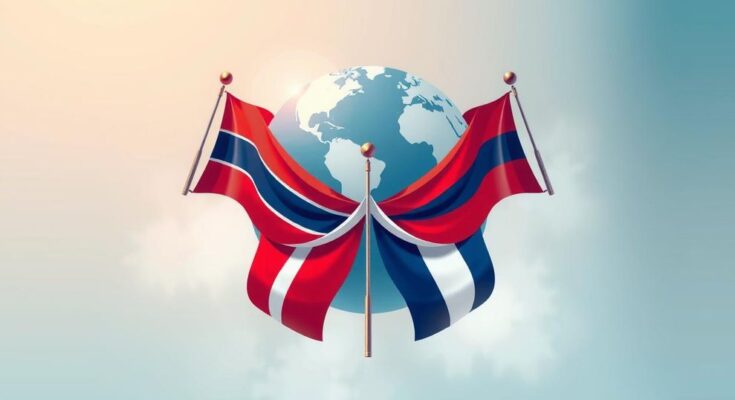Russian President Vladimir Putin met Guinea-Bissau’s President Umaro Sissoco Embalo to strengthen bilateral relations. Key areas of focus included educational cooperation and economic collaboration, with an emphasis on increasing trade and investment. The meeting underscored the historical ties and mutual benefits as both nations navigate regional challenges together.
On February 26, 2025, President Vladimir Putin hosted Guinea-Bissau President Umaro Sissoco Embalo at the Kremlin, reflecting the ongoing efforts to strengthen bilateral relations between Russia and Guinea-Bissau. This visit marked President Embalo’s fourth trip to Russia since taking office, highlighting the importance of their partnership.
During the meeting, significant figures from the Russian government, including Deputy Prime Minister Alexander Novak and Presidential Aide Yuri Ushakov, were present. President Putin expressed appreciation for Guinea-Bissau’s participation in the previous year’s Russia-Africa Summit, emphasizing the successful, respectful, and trust-based relationship built over 52 years.
President Embalo welcomed Putin warmly, expressing gratitude with his remark, “Thank you, brother, dear Putin!” He underscored the strong friendship between their nations and cultural ties, reiterating his commitment to enhancing their partnership as brotherly nations.
A key agenda item was educational cooperation, with President Putin announcing increased quotas for students from Guinea-Bissau wishing to study in Russia, particularly in military specialties. This initiative aims to bolster the skills of Guinea-Bissau’s military while supporting the development of its human resources.
Embalo acknowledged Putin’s contributions to educational opportunities, highlighting the rising ambition of Bissauan youth to pursue studies abroad, especially in Russia. This growing educational engagement is integral to fortifying bilateral ties through academic exchanges for mutual benefit.
In terms of economic collaboration, President Putin called for heightened trade relations, stating, “I hope we can agree on the increase of these relations,” particularly in investment and resource extraction projects focused on minerals. The two nations aim to enhance cooperation across various economic sectors.
Putin reported a 10% increase in trade between Russia and Africa last year, indicating a growing interest from Russian businesses in Guinea-Bissau’s market, paving the way for future economic growth. Given Guinea-Bissau’s status as one of the poorest countries reliant on agriculture, this partnership could provide vital developmental support.
Amid discussions, recent debt relief efforts by Russia, including the cancellation of $26.7 million owed by Guinea-Bissau, further illustrate Russia’s commitment to strengthening ties. Topics concerning military and humanitarian partnership were also broached, including potential access for Russian naval vessels to Bissauan ports.
The partnership aims to address broader concerns, such as food security and agricultural imports, crucial to Guinea-Bissau’s socio-economic landscape. Political analysts anticipate that enhanced collaboration may contribute to stability and economic progress in Guinea-Bissau, particularly as President Embalo seeks reelection later this year.
Future discussions have been scheduled to elaborate on the initiatives agreed upon in this meeting. A working lunch is set to facilitate ongoing dialogue aimed at reinforcing commitments to mutual cooperation and identifying actionable outcomes.
This meeting at the Kremlin exemplifies the historical ties between Russia and Guinea-Bissau and the leaders’ commitment to further strengthening these connections. Through continued collaboration, both nations are well-positioned to navigate regional challenges and pursue future successes together.
The meeting between Presidents Putin and Embalo underscores the deepening ties between Russia and Guinea-Bissau through expanded educational and economic cooperation. Embalo’s commitment to strengthening their partnership and Putin’s acknowledgment of longstanding diplomatic relations highlight the mutual benefits envisioned in this collaboration. Both nations are poised to tackle regional issues and foster growth through this evolving bilateral relationship.
Original Source: evrimagaci.org




